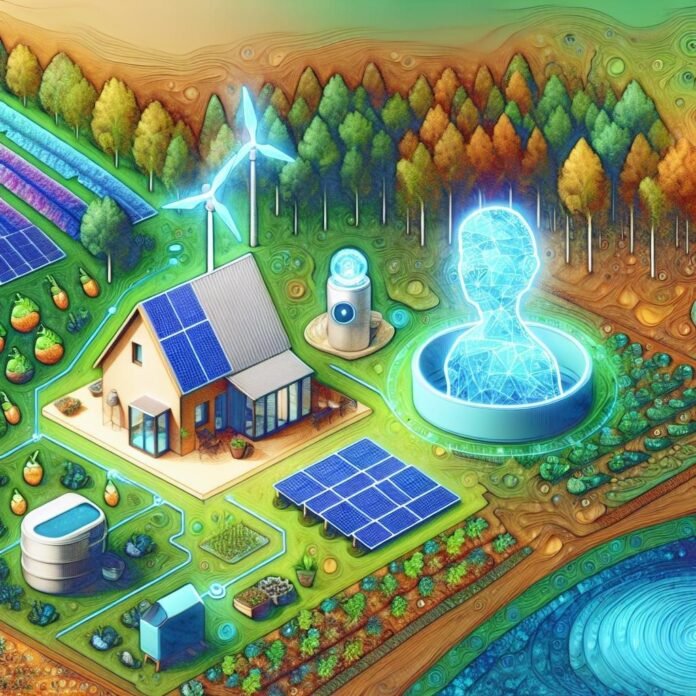in a world increasingly driven by the pursuit of sustainability and self-sufficiency, off-grid living has emerged as a compelling lifestyle choice for many. Whether it’s motivated by environmental concerns, a desire for independence, or simply the allure of a simpler life, more individuals and communities are opting for solutions that allow them to break free from conventional energy grids. Though, living off the grid presents its own set of challenges, especially in managing energy resources efficiently. Enter artificial intelligence (AI), a transformative technology that is revolutionizing how we approach energy management in off-grid setups. From optimizing solar panel efficiency to smart battery management and predictive analytics, AI is not just enhancing the DIY aspect of off-grid living—it’s ensuring that it can be sustainable and reliable. In this article, we will explore the pivotal role AI plays in enhancing energy management for off-grid communities and how this technology is shaping the future of sustainable living.
Table of Contents
- Exploring AI-driven Solutions for Sustainable Energy efficiency
- Harnessing predictive Analytics to Optimize Energy Consumption
- Smart Energy Storage Systems: The Future of Off-Grid Living
- Integrating Renewable Sources: Maximizing Potential with AI Technology
- Concluding Remarks
Exploring AI-Driven Solutions for Sustainable Energy Efficiency
the advent of artificial intelligence is revolutionizing the way we approach energy management, especially in off-grid settings. By integrating smart algorithms with renewable energy sources, AI systems can predict energy consumption patterns and adjust energy generation accordingly. This means households can more efficiently utilize resources, maximizing solar, wind, or alternative energy inputs while minimizing waste. Key benefits include:
- Enhanced Predictive Analytics: AI can analyze historical consumption data to forecast future energy needs.
- Dynamic Energy Distribution: Bright systems allocate energy where it’s needed most, reducing bottlenecks.
- Maintenance Optimization: predictive maintenance reduces downtime,ensuring systems run at peak efficiency.
Furthermore, by leveraging machine learning, off-grid homes can become increasingly self-sufficient. These AI-driven solutions not only simplify energy management but also contribute to a reduction in carbon footprints and overall environmental impact. With user-friendly applications and dashboards,residents can monitor and adjust their energy usage in real-time. Consider the following comparison of traditional versus AI-enhanced systems:
| Aspect | Traditional Systems | AI-Enhanced Systems |
|---|---|---|
| Energy Consumption Monitoring | Manual tracking | Real-time analytics |
| Response to Outages | Delayed reaction | Instant diagnostics |
| Energy Optimization | Static allocation | Dynamic adjustments |
Harnessing predictive Analytics to Optimize Energy Consumption
Predictive analytics is revolutionizing how off-grid communities manage their energy resources, enabling a more sustainable and cost-effective approach to energy consumption. By analyzing historical usage data and identifying patterns, these advanced algorithms can forecast energy demands and consumption peaks.This foresight empowers individuals and community leaders to make informed decisions about energy allocation and storage. Key benefits include:
- Enhanced Energy Efficiency: By anticipating energy needs, users can minimize waste and optimize the use of renewable sources.
- Cost Savings: Better predictions lead to reduced reliance on costly backup systems, allowing for smarter investments in energy infrastructure.
- Increased Reliability: Predictive insights enhance the reliability of energy supply, ensuring that needs are met without interruptions.
In leveraging predictive analytics, off-grid systems can implement dynamic energy pricing models that reflect real-time supply and demand. This approach not only encourages consumers to adjust their usage during peak times but also incentivizes energy conservation and the adoption of renewable practices. The following table illustrates how different predictive models can be integrated into energy management systems:
| Predictive Model | Description | Request |
|---|---|---|
| Time Series Analysis | Analyzes historical data trends to forecast future consumption. | Adjusting energy storage levels based on predicted demand. |
| Machine Learning Algorithms | Utilizes large datasets to identify complex patterns in energy usage. | Personalized energy consumption recommendations for users. |
| Regression Analysis | Examines relationships between different variables affecting energy use. | Optimizing appliance usage based on external factors like weather. |
Smart Energy Storage Systems: The Future of Off-Grid Living
As off-grid living gains popularity, the demand for smart energy storage systems is becoming increasingly vital. These advanced systems utilize cutting-edge technology to efficiently store and manage energy, ensuring a reliable supply for everyday needs. Key benefits include:
- Improved Energy Efficiency: Smart energy storage systems optimize energy use by storing excess power generated from renewable sources, such as solar panels.
- Enhanced Reliability: These systems provide backup power, allowing off-grid homes to maintain essential functions during outages or unfavorable weather conditions.
- Data-Driven Insights: Utilizing AI algorithms, these systems analyze energy consumption patterns, helping users make informed decisions to reduce waste and lower costs.
Incorporating AI into energy management takes smart energy storage a step further, allowing for real-time monitoring and predictive analytics. This intelligent approach leads to:
- Automated Adjustments: AI can automatically adjust energy usage based on demand and available renewable resources, balancing supply and demand seamlessly.
- Forecasting Needs: Predictive models help anticipate energy usage and generate reports that inform future energy storage requirements.
- Integration with Smart Home Devices: These systems work synergistically with other smart technology, enhancing the overall energy ecosystem in off-grid living.
Integrating Renewable Sources: Maximizing Potential with AI Technology
As the world pivots towards sustainable energy solutions, integrating renewable sources like solar, wind, and hydroelectric power is more crucial than ever. Artificial Intelligence (AI) plays an essential role in optimizing these energy systems, enabling a seamless interaction between energy generation and consumption. AI algorithms can analyze vast amounts of data in real time, helping households make informed decisions about energy use, storage, and distribution. This leads to efficient energy management, reduced costs, and a minimized carbon footprint. A few key benefits of AI in renewable energy integration include:
- Predictive analytics: AI can anticipate energy needs based on consumption patterns, weather data, and historical usage.
- Smart Grid Management: Facilitating a balanced load across grids by distributing renewable energy based on availability and demand.
- Storage Optimization: Enhancing battery performance by determining the best times to store or draw energy.
Moreover, advanced AI systems empower users to engage with their energy systems proactively.Through intuitive dashboards and mobile applications, individuals can monitor their energy generation and consumption in real-time, providing insights that foster better energy habits. In off-grid living scenarios, where energy independence is paramount, this technology not only supports energy autonomy but also enhances the resilience of renewable systems. An example of this technological synergy can be found in AI-driven smart devices that automate energy-intensive tasks based on peak and off-peak times, which conserves energy and maximizes the output of available renewable sources. Consider the following table summarizing the key features of AI in energy management:
| Feature | Description | Benefit |
|---|---|---|
| Data Analytics | Real-time analysis of energy consumption data. | Optimize energy usage and reduce waste. |
| Load Forecasting | Predict future energy demands. | Enhance resource allocation for energy supply. |
| Automated Controls | Smart management of energy loads and resources. | Improve efficiency and comfort in energy usage. |
Concluding Remarks
As we stand on the brink of a new era in energy management, the integration of AI into off-grid living systems presents exciting possibilities that extend far beyond mere convenience. With its ability to optimize energy consumption,predict power demands,and integrate seamlessly with renewable sources,AI is not just a tool but a game-changer for those looking to embrace a more sustainable and self-sufficient lifestyle.
The vision of off-grid living is evolving from a niche lifestyle to a mainstream reality, largely thanks to the advancements in technology. As we continue to harness the power of AI, the potential to enhance our energy autonomy while reducing our environmental footprint becomes increasingly attainable. Whether you’re a seasoned off-grid enthusiast or considering the transition for the first time, understanding and leveraging these intelligent solutions can unlock new levels of efficiency and sustainability in your energy management practices.
the future of off-grid living is shining, propelled by innovative technologies that can help us optimize our resource use and connect more deeply with the environment. As we move forward, embracing these advancements will not only ensure a reliable and sustainable energy supply but will also pave the way for a more resilient and self-sufficient future for generations to come. So, whether you’re exploring solar panels or smart energy systems, remember that with the right tools, your off-grid journey can flourish like never before.

